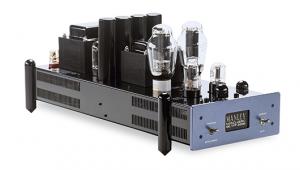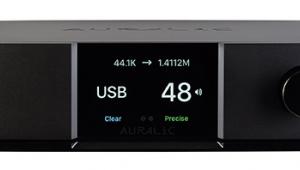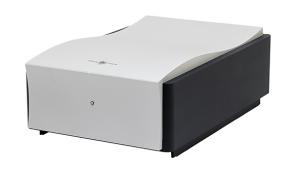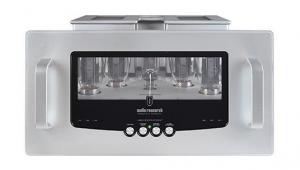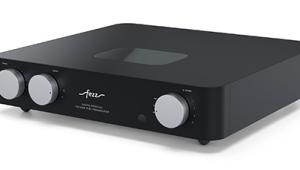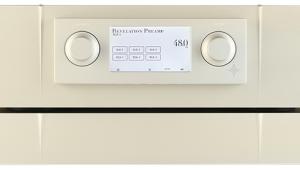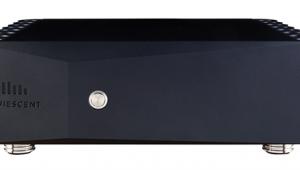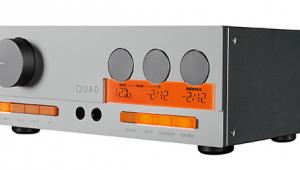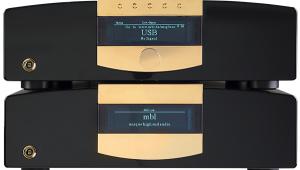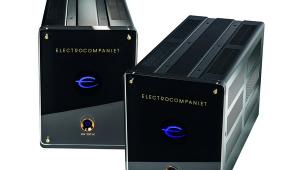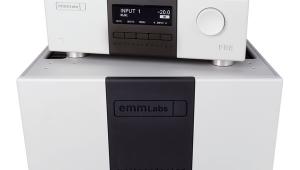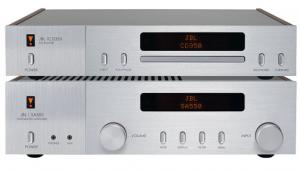Krell Illusion II/KSA-i400 Pre/Power Amplifiers Lab Report
Krell Illusion II
There's no ALPS pot in the Illusion II preamplifier but a digitally-governed, 12-bit R-2R ladder volume control that operates over a phenomenal 151-steps, equivalent to a useable range of 65dB. The top 50 steps (101-151) represent a 10.8dB range (~0.2dB per step), the next 50 steps (051-101) operate over 17.5dB (~0.35dB per step), becoming slightly coarser over the remaining 37dB. The maximum (balanced) gain is +12.0dB, facilitating a maximum output of 18.2V from a 150ohm source impedance (max input is 8.4V). Distortion is lowest at 1-2V output at 0.00018-0.001% (re. 20Hz-20kHz), increasing to 0.0018-0.0025 at 6V. The S/N is a wide 97.3dB (A-wtd, re. 0dBV) while the analogue in/out frequency response is flat to within ±0.03dB from 2Hz-1kHz before extending up to 100kHz within ±0.005dB! Importantly, and in contrast with many amps/preamps, the volume circuit is correctly buffered and so the Illusion II's HF response does not change with volume position.
Used as a DAC/preamp, the Illusion II delivers a 16.2V balanced output for a 0dBFs digital input. Distortion is ~0.02% at this full scale input and falls to a minimum of 0.00018%/1kHz and 0.001%/20kHz over the top 40dB of its range [see Graph 1, below]. The A-wtd S/N is a very useable 110.0dB, linearity good to ±0.5dB over a 110dB range and channel separation a very fine 135dB. The ES9018 DAC has excellent built-in jitter rejection and this is not squandered in the Illusion II where the mere ~18psec is primarily linked to the onboard PSU [see Graph 2]. Krell's choice of linear phase/fast roll-off digital filter defines the 83dB stopband rejection and 'digital' response of –0.2dB/20kHz, –0.8dB/45kHz and –2.2dB/90kHz with 48kHz, 96kHz and 192kHz media, respectively. PM
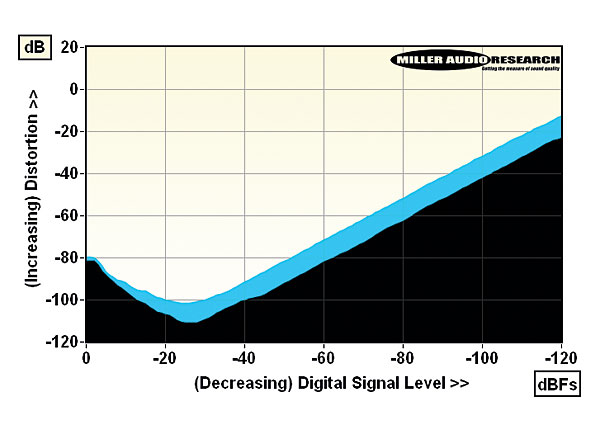
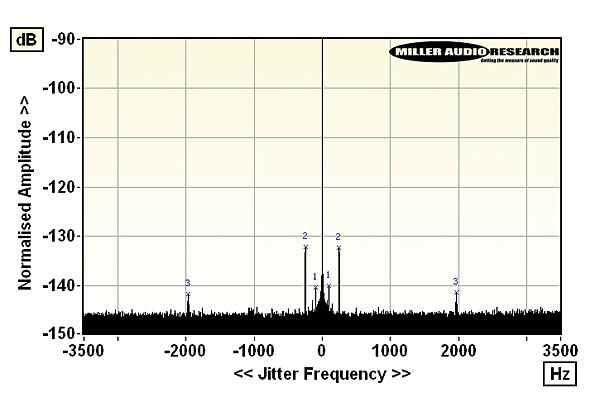
| Maximum output / Impedance | 18.2V / 149-150ohm (balanced) |
| Input sensitivity (re. 0dBV) | 250mV (balanced) |
| Freq. resp. (20Hz-20kHz/100kHz) | +0.02 to –0.00dB/–0.005dB (pre) |
| Freq. resp. (20Hz-20k/45k/90kHz) | +0.0 to –0.2dB/–0.8dB/–2.2dB (DAC) |
| Digital jitter (USB at 48kHz/96kHz) | 18psec / 7psec |
| A-wtd S/N ratio (re. 0dBV/0dBFs) | 97.3dB (Analogue) / 107.1dB (Dig) |
| Distortion (20Hz-20kHz; 0dBV/0dBFs) | 0.0004-0.001% / 0.008-0.0085% |
| Power consumption | 56W (21W standby) |
| Dimensions (WHD) / Weight | 438x97x464mm / 10.4kg |
| Prices | £13,500/£40,998 |
Krell KSA-i400
Historically, Krell has set the standard for packing maximum power into as compact a chassis as possible, and all without going down the switchmode PSU/Class D route – its S-550i integrated [HFN Jul '13, and p61] being a classic case in point. Of course, the KSA-i400's 73kg, 660mm-deep enclosure is far from 'compact' but then neither is its rated 400W/8ohm the stuff of small boxes. In practice this behemoth delivered 2x483W and 2x845W into 8/4ohm loads, respectively, with a further uplift under dynamic conditions to 500W, 990W, 1.95kW and 3.61kW into 8, 4, 2 and 1ohm loads. Note the incredible 'stiffness' of the PSU regulation to deliver a near doubling of power into each halving of load impedance [see Graph 1] and where the 60A output into 1ohm is 'limited' only by Krell's electronic protection. As Krell claims, the amp's output impedance is both low and remarkably 'flat' at 0.015-0.018ohm (20Hz-20kHz), maintaining a response that's also flat to within ±0.1dB from 2Hz-20kHz across 8, 4, 2 and 1ohm loads. Gain is a sensible +26.4dB (balanced input) and noise is low too, given the total 5400VA PSU, promoting an above-average 89.5dB A-wtd S/N ratio.
The KSA-i400's distortion profile is arguably more interesting and is undoubtedly informed by Krell's various 'Current-Mode', iBias and XD circuit regimes. Versus frequency, distortion is typically lowest through the midrange (down to 0.002%/1kHz) but higher at the audio frequency extremes – 0.013%/20Hz and 0.0065%/20kHz at 10W/8ohm [see Graph 2]. Versus level, there's a more marked trend with distortion starting 'high' at 0.007%/1W, falling to a minimum of 0.00009% at 20-30W, then rising to 0.005%/200W and 0.0075%/400W. PM
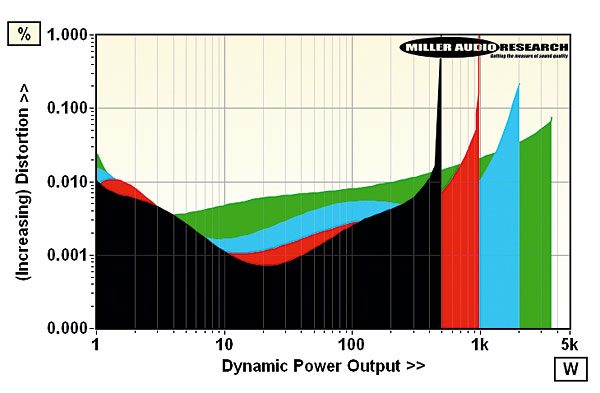
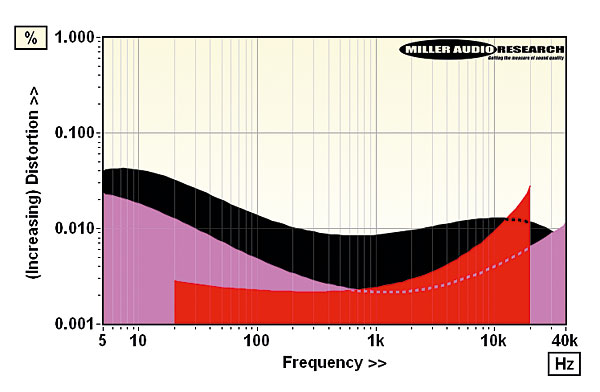
| Power output (<1% THD, 8/4ohm) | 483W / 845W |
| Dynamic power (<1% THD, 8/4/2/1ohm) | 500W/990W/1.95kW/3.61kW |
| Output imp. (20Hz–20kHz/100kHz) | 0.015-0.018ohm / 0.105ohm |
| Freq. resp. (20Hz–20kHz/100kHz) | +0.0dB to –0.08dB/–1.0dB |
| Input sensitivity (for 0dBW/400W) | 135mV / 2750mV |
| A-wtd S/N ratio (re. 0dBW/400W) | 89.5dB / 115.5dB |
| Distortion (20Hz-20kHz, 10W/8ohm) | 0.0022-0.013% |
| Power consumption (Idle/Rated o/p) | 225W / 1.91kW (1W standby) |
| Dimensions (WHD) / Weight (total) | 438x239x610mm / 73kg |
| Prices | £13,500/£40,998 |




